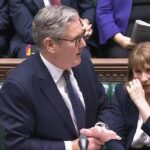Sir Keir Starmer marks his first year as the United Kingdom’s prime minister with a historic parliamentary majority, the largest seen in over 25 years. This commanding mandate has allowed him to navigate a year filled with cautious reforms and significant international developments. His leadership has been characterized by strategic maneuvers, including a landmark US-UK trade deal and a series of policy reversals that have tested the unity of his party.
Starmer’s first year in office has been a period of both opportunity and scrutiny. As he reflects on the past 12 months, several pivotal moments stand out, each contributing to the shaping of his premiership and the future of the UK.
Securing the US-UK Trade Deal
One of Starmer’s major achievements was the successful negotiation of a trade deal with the United States, a move that has been hailed as a significant economic boost for the post-Brexit UK. The deal, finalized with former US President Donald Trump, aims to strengthen economic ties and open up new markets for British businesses.
“This trade deal marks a new era of collaboration between the UK and the US, promising increased economic growth and job creation,” said Starmer during the signing ceremony.
The announcement comes as the UK seeks to redefine its international relationships following its departure from the European Union. Experts suggest that this deal could serve as a template for future agreements with other global partners.
Policy U-Turns and Party Discipline
Starmer’s leadership has also been marked by a series of policy U-turns, which have at times challenged the cohesion within the Labour Party. These reversals, often in response to public and political pressure, have included changes in stance on issues such as taxation and public spending.
According to sources within the party, these shifts have been necessary to adapt to the rapidly changing political landscape and ensure the party remains aligned with voter expectations. However, they have also led to internal debates about the direction of the party under Starmer’s leadership.
Addressing the NHS and Public Health
Another defining aspect of Starmer’s first year has been his focus on the National Health Service (NHS) and public health, particularly in the wake of the COVID-19 pandemic. His government has committed significant resources to bolster the NHS, aiming to reduce waiting times and improve patient care.
Statistics show that NHS funding has increased by 10% in the past year, reflecting the government’s commitment to healthcare reform.
Meanwhile, Starmer’s administration has also prioritized mental health services, recognizing the growing need for support in this area. These efforts have been widely praised by health experts and advocacy groups.
International Climate Commitments
Starmer’s tenure has also been marked by a strong commitment to addressing climate change. The UK hosted the COP26 summit, where Starmer played a key role in advocating for ambitious global targets to reduce carbon emissions.
The move represents a significant shift in the UK’s approach to environmental policy, with Starmer emphasizing the importance of international cooperation in tackling climate change. His administration has pledged to achieve net-zero emissions by 2050, a goal that will require substantial changes in energy production and consumption.
As Starmer looks ahead to his second year in office, the challenges and opportunities remain numerous. His leadership will continue to be defined by his ability to navigate complex domestic and international issues while maintaining the support of his party and the public.
The next steps for Starmer’s government will likely involve further consolidating its position on the global stage, continuing to address domestic policy challenges, and ensuring that the UK remains a leader in innovation and economic growth.
 Portsmouth Police Seek Witnesses in Serious Assault Case
Portsmouth Police Seek Witnesses in Serious Assault Case Southsea Grandmother Denies Coercive Control Allegations in Court
Southsea Grandmother Denies Coercive Control Allegations in Court Starmer Defends Reeves Amid Emotional Commons Moment and Market Jitters
Starmer Defends Reeves Amid Emotional Commons Moment and Market Jitters Rachel Reeves: Tears and Turning Points for the UK Chancellor
Rachel Reeves: Tears and Turning Points for the UK Chancellor Portsmouth Pupils Experience Classical Music with Playground Proms
Portsmouth Pupils Experience Classical Music with Playground Proms